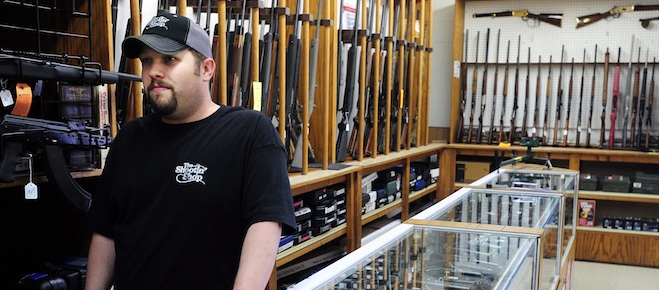The arms race no one is talking about
Gun control isn’t about fulfilling a utopian fantasy, an all-or-none sum game. It’s about harm reduction.
Patrick Cowen, owner of The Shootin Shop, stands behind the counter on Thursday, July 26, 2102. Cowen said more people have come to buy weapons and ammunition this week out of fear that gun control laws will change in the coming months. “People are kind of worried they will put a ban on assault rifles,” Cowen said. (AP Photo/The Abilene Reporter-News, Joy Lewis)
Share

Politicians are experts at ambiguity. But one of those experts—President Barack Obama (remember his ever-“evolving” position on gay marriage?)—surprised us this week when he made an entirely unambiguous statement about the controversy of the day: gun control and the right to bear arms in America. In the aftermath of the horrific Aurora, Colo., movie-theatre shooting, Obama made his stance explicitly clear: Americans should continue to have the right to bear arms, he stated, but it was worth asking what kind of arms that entailed. “I think that a lot of gun owners would agree,” said Obama, “that AK-47s belong in the hands of soldiers, not criminals—that they belong in the battlefields of war, not on the streets of our cities.” Policy steps to reflect that perspective, he continued, “shouldn’t be controversial, they should be common sense.”
Would that common sense was bipartisan: Republican presidential candidate Mitt Romney made his own statement about gun control this week (hint: he’s not a fan). “We can sometimes hope,” he said, “that changing a law will make all bad things go away. Well it won’t.” What can? “Changing the heart of the American people,” said Romney.
Let’s forget for a moment the fact that President Obama—a man consistently referred to as soft and weak by his opponents, offered his people a policy-driven, tough-on-crime solution to gun violence, and Mitt Romney—the man who’d like to unseat him—offered his nation what could be the tag line of the Oprah Winfrey show. And let’s look instead at Romney’s initial statement, the one about wishing laws would “make all the bad things go away,” with a particular emphasis on the word “all.” Why? Because that little word reveals one of the most glaring fallacies in the anti-gun-control argument: their apparent belief that gun-control advocates are hopeless idealists, under the impression that stricter gun legislation will eradicate gun violence forever. Of course, it won’t. What it might do, however, and what the pro-gun-control lobby actually thinks it might do, is mitigate some of that violence. Some. Not all.
But for ideologues, especially in America, “some” just doesn’t have the right ring to it. “All or none” captures the gung-ho spirit of the United States, a country of absolutes. So it follows that the right in the U.S. would far rather own Mitt’s “all” attitude, and they’d also rather project an “all” perspective onto the other side, because it’s so much easier, ironically, to rebut. As in, “What kind of idiot hippie thinks a gun-control law will stop all the lunatics out there from shooting up schools?” Trivialize your opponent’s position and perhaps nobody will notice the holes in your own (changing the heart of the American people?). The irony is that the right is far more absolutist and idealistic on this issue than the left, because it actually believes that any regulation around guns at all is an automatic erosion of a fundamental right. That’s right: losing your right to arm yourself like a Navy SEAL amounts to losing your right to bear arms at all.
Americans have an attachment to guns that Canadians don’t. But what began as a necessity for their ancestors—bearing arms against the British—has evolved into a modern-day fetish, touted every day by the NRA and its four-million-plus membership. Promote gun control, says the NRA, and shame the Constitution.
However, the voice of reason behind gun control in the United States right now isn’t asking why the Second Amendment is necessary, but why it’s necessary for the average American—and in the case of the Colorado accused, James Holmes, the-not-even-remotely-average American—to have the right to buy 6,000 rounds of live ammunition on the Internet and to purchase a weapon that could kill dozens of people in a matter of seconds. The NRA is right: a person intent on committing such a crime will do so no matter what laws the government writes to stop him. But why should a society make it easy for him? In the words of Sen. Frank Lautenberg, one of two Democratic lawmakers lobbying to ban anonymous ammo sales, “It’s time to close the loophole that’s allowing killers and even terrorists to buy ammunition online.” Romney says it’s foolish to condemn the instrument of violence as opposed to the violent person (hate the sinner, not the sin?), but doesn’t the instrument of violence in this case speak for itself?
Gun control isn’t about fulfilling a utopian fantasy, an all-or-none sum game. It’s about harm reduction, something that’s hard to measure, but that, judging from gun-murder numbers the non-American world over, obviously works. There’s been a spate of public shootings in the recent past where I live, for instance—an extraordinary number by Canadian standards—but the one source of comfort for me is the fact that the people responsible, gang members or otherwise, at the Eaton Centre, in Little Italy or Scarborough, were not carrying assault weapons like James Holmes was in Colorado. The main reason is that such weapons are illegal for private citizens to own in this country. Have the shootings here been tragic? Undeniably. Could they have been worse? Undeniably. The law did not work perfectly, but it worked somewhat. And that somewhat, for the people who avoided being killed in the shootings here, was a blessing. Just as if James Holmes had been armed with a pistol and not a semi-automatic rifle that fires 60 rounds a minute.